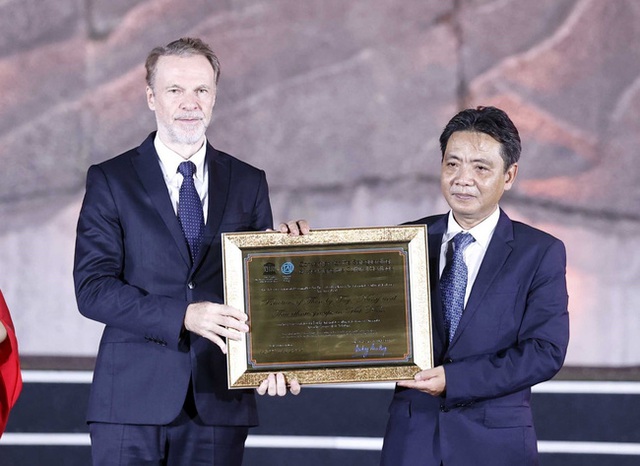Practices of Then receive UNESCO certificate for Intangible Cultural Heritage of Humanity
VGP - A ceremony was held on Saturday in the northern province of Tuyen Quang to receive UNESCO certificate accrediting Practices of Then by Tay, Nung, and Thai ethnic minority groups in Viet Nam as an intangible cultural heritage of humanity.

UNESCO Representative to Viet Nam Christian Manhart hands over UNESCO certificate accrediting Practices of Then by Tay, Nung, and Thai ethnic minority groups in Viet Nam as an intangible cultural heritage of humanity to Deputy Minister of Culture, Sports and Tourism Hoang Dao Cuong, Tuyen Quang, September 3, 2022
The practices were officially inscribed in 2019 on the UNESCO Representative List of the Intangible Cultural Heritage of Humanity.
Then, an essential ritual practice in the spiritual life of the Tay, Nung and Thai ethnic groups in Viet Nam, reflects concepts about human beings, the natural world and the universe.
Then ceremonies describe a journey in which the Then Master (male or female) controls ghost soldiers travelling from the earth realm to the heaven realm, to offer items of worship and present their prayers for peace, for treating illnesses, good crops, a happy new year, etc.
The Then Master starts the journey by singing and plucking a tính lute. Depending on the worshipping purposes, Then masters arrange worship trips to pray to different native Gods. Then masters use various items – such as a demon-expelling sword, a yin and yang rod, a bell, etc. – to perform ceremonies in the believer's house, outdoors or at the Then alter of the Master's house.
The Master wears ceremonial dress, sings in the language of their ethnic group, plays the tính lute, shakes rattle-bells and waves a fan.
Some ceremonies are accompanied by a female dancing group. Then is always transmitted orally while its rituals are conducted, reflecting its succession between the generations, and Then Masters play a key role in passing on the related skills and know-how, with some conducting around 200 ceremonies a year.
The Tay, Thai and Nung ethnic minorities have passed on this longstanding tradition through generations by word of mouth./.
